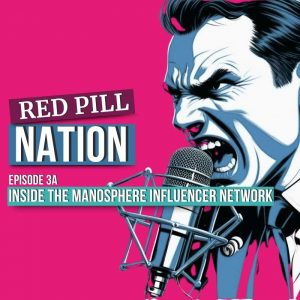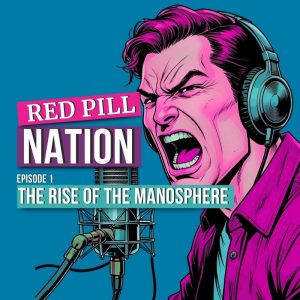Language, Lies & Loaded Terms
In Episode 1 of Red Pill Nation, I mapped the rise of the manosphere. The sprawling network of influencers, forums, and communities is bound together by hostility toward women. This time, we’re going deeper into one of its most powerful tools: language.
The vocabulary of the manosphere goes beyond casual slang. It works like a code, telling members how to think, who they should view with suspicion, and what version of the world to believe in. These terms don’t simply describe things, they act as Trojan horses, carrying misogyny and resentment into everyday conversation.
“Language is the operating system of the manosphere. Once you speak it, you start to think in it.”
Why Vocabulary Matters
Every movement has its jargon, but in the manosphere, language is both the glue that holds the community together and the bait that draws in new recruits. Terms can sound harmless until you understand the worldview behind them. They serve as a quick litmus test: if you know the code, you’re in. If you don’t, you’re an outsider.
Therese outlines four primary subcultures within the manosphere. Incels, pickup artists (PUAs), “Men Going Their Own Way” (MGTOW), and men’s rights activists (MRAs). Each group has its own particular grievances, but they speak a similar language.
That language builds both belonging and a sense of authority. For someone new, learning the terms can feel like being let in on a secret. In truth, it’s often the first step toward falling in line with the ideology.
The Recruitment Power of Words
Manosphere terms often seep into mainstream spaces through influencers, dating advice, or social media memes. A teenager might first hear “alpha male” or “red-pilled” in a YouTube video that seems unrelated to politics. But these terms are designed to stick and to lead the curious further down the pipeline.
Parents, teachers, and mentors should treat these terms as red flags. If you hear them in casual conversation, it’s not paranoia to ask where they came from. Many young men first encounter manosphere language indirectly, through friends or influencers they follow for unrelated content.
“Once you understand the language, you can’t un-hear it. It shows up everywhere — in dating advice, gym culture, and even self-help podcasts.
Breaking Down the Lexicon
The transcript covers dozens of terms, but a few play an outsized role in shaping the worldview:
- Red-Pilled – Taken from The Matrix, this phrase signals an “awakening” to the belief that feminism has damaged society and placed men at a disadvantage.
- Alpha/Beta Male – This ranking comes from old animal behavior studies that have since been debunked. In manosphere circles, it’s used to push dominance and brush off empathy.
- SMV (Sexual Market Value) – Treated like a kind of currency, it’s a pseudo-economic way of rating human worth, especially women’s, based on age, looks, and supposed fertility.
- Chad/Stacy – These are stock characters for men and women who are seen as sexually successful, and the labels are meant to stir resentment toward them.
- Hypergamy – The idea that women are naturally inclined to “trade up” for partners with higher status, and it’s often framed as deliberate or even flat-out immoral.
They might look like harmless labels when you first hear them, but each one is basically a ready-made argument, carrying a whole worldview in a single word or acronym.
The Slippery Slope
Language is often the first stage of radicalization. A young man might start by laughing at a meme about “beta males” and end up absorbing the manosphere’s broader ideology without realizing it. Once the vocabulary becomes natural, the ideas behind it feel self-evident.
This process is deliberate. Influencers know that new recruits are more likely to accept radical ideas if they first master the language. Words become cognitive shortcuts. Why explain an entire misogynistic theory when you can drop a single term and have the meaning instantly understood?
How to Break the Spell
Therese’s advice is simple: challenge the language. If you hear someone using these terms unironically, ask what they mean by them. Press for definitions. Often, the person repeating them won’t be able to explain beyond a surface-level slogan. That’s the crack in the armor.
The antidote to coded hate speech isn’t just banning words, it’s exposing the worldview they conceal. Once the hidden meaning is in the open, the term loses its power as an insider’s code.
The Stakes of Comprehension
This episode isn’t just a dictionary. It’s a warning. The manosphere’s language is designed to sound intelligent, scientific, and even benevolent. Strip away the slick acronyms and pop culture nods, and what’s left is plain to see: it’s propaganda.
And like all propaganda, it works best when you don’t realize you’re repeating it.



